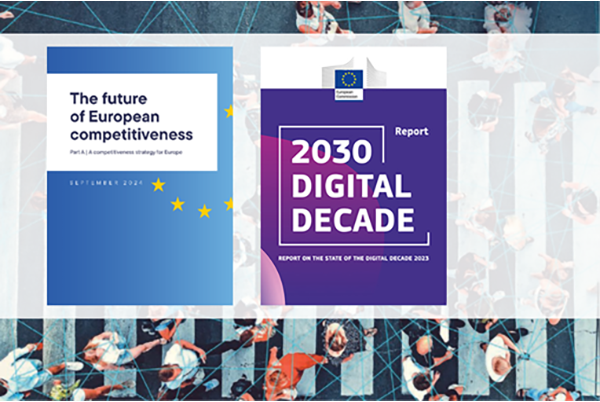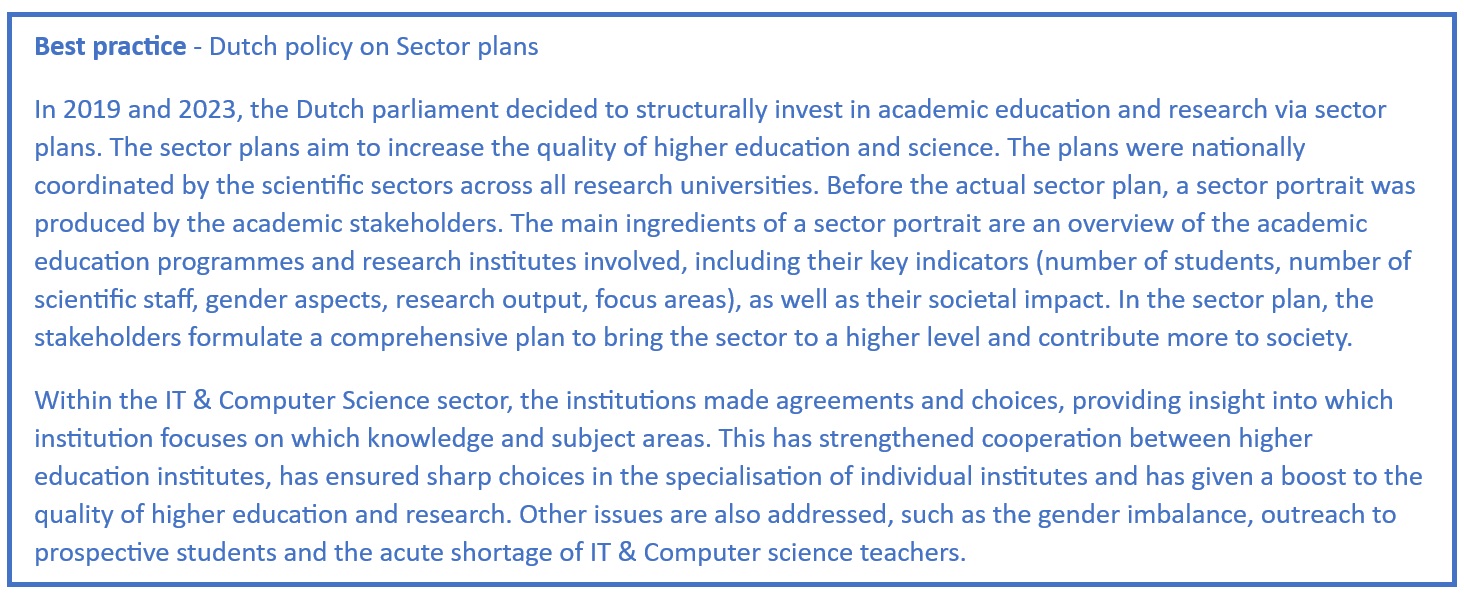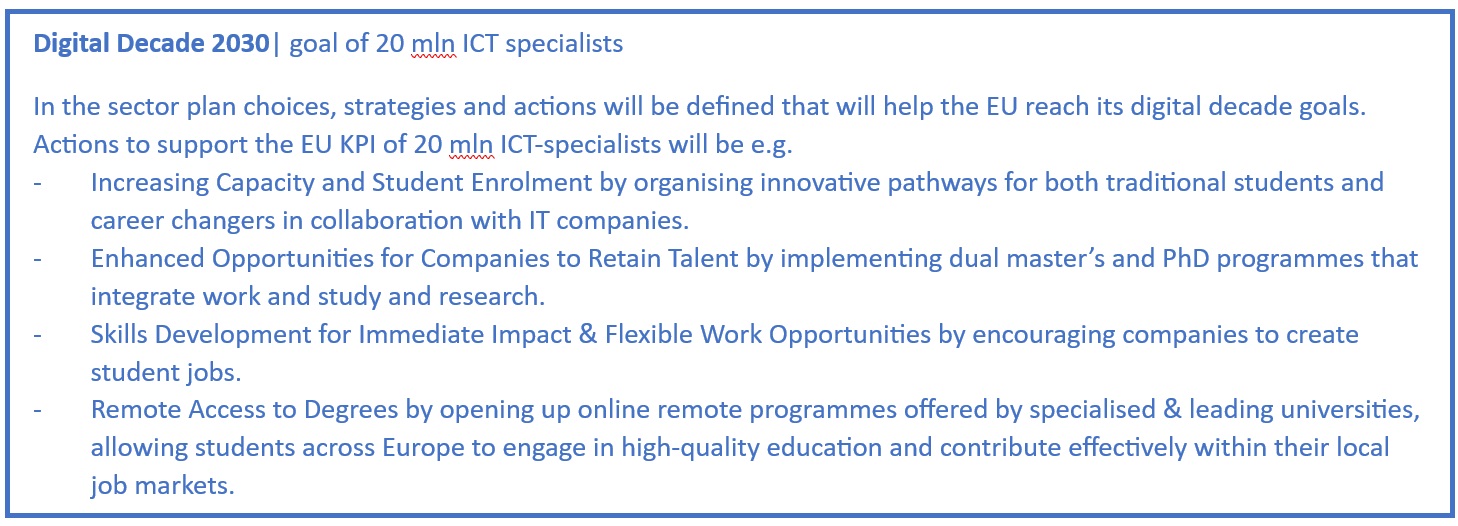In the context of digitalisation and digital transformation, IT & Computer Science research & education plays a crucial role in addressing economical, societal & political challenges and shaping opportunities that emerge for a secure, prosperous and sustainable future. Addressing these challenges and opportunities requires coordinated and robust European investment in IT & Computer Science education and research. Following a Dutch example on sector plans, this document introduces the idea of a European Sector Plan in IT & Computer Science — an initiative that can be shaped, fostered, and executed by all higher education and research institutes across Europe.
This is an instrument by which the European Union (EU) can steer the academic field, thereby advancing digital sovereignty, spurring innovation and especially, addressing human capital challenges.
Increasing impact: European sector plan in IT & Computer Science
Building on the good experiences with the Dutch national sector plan we believe that a sector plan at European level could give a boost to Europe’s higher education and research. The recent report by Mario Draghi stressed the lagging behind of the EU in innovation and in the digital revolution specifically. The 2024 State of the Digital Decade report urges all stakeholders to make greater efforts with focus on realising sufficient progress towards objectives and targets, and solving significant disparities among Member States. In the Global Ranking of Academic Subjects of 2023, only four European universities and institutes are in the top 100 of the ranking of the Computer Science & Engineering discipline. Compared to other fields such as physics or mathematics (respectively 33 and 27 European institutes in the top 100), the European IT & Computer science field is lacking (far) behind. Current and future challenges in the domain of IT & Computer Science require a coordinated and robust investment in this domain. The main combined challenges and opportunities are:
- Digital sovereignty & competitiveness: Currently, the EU does not succeed in keeping up with large digital economies like India, the United States and China. European institutions and governments are increasingly dependent on the digital infrastructure of non-European ‘big tech’ companies. This does not only have economic implications but also challenges Europa’s independence and its public values and (cyber) security. Only the EU as a whole, can create enough mass to gain competitive advantage on a global scale. This is crucial in aiming for long-term welfare and stability.
- Human Capital: In 2021, only 4% of the graduates in the EU were in the IT field and in 2022, over 9 million people in the EU – 5% of the total employment – worked as IT specialists. Following the EU’s digital targets as stated in the Digital Decade, this should increase to at least 20 million IT specialists in 2030. This asks for a huge increase in IT graduates in the coming years. Higher education should be equipped to educate and train these IT professionals. Additionally, there are related challenges to this, such as the gender gap in the IT field and the brain drain to the United States.
- European integration: Higher education and research in the EU can be strengthened by better organisation and collaboration, which is highlighted as well in the 2024 report by Enrico Letta. Sector plans are an instrument by which the EU can, in collaboration with the domains, steer the sector and make profiling choices and specialisation across the sector.
- Innovation and industry: Technical innovations in areas such as software engineering, AI and quantum computing have been based on academic research. To maintain a competitive position in the global market, the EU needs to invest now into cutting-edge research leading to the development of future technologies, products and services.
The potential impact of a European Sector Plan is further underscored by the success of leading companies in our continent, such as ASML, Siemens, Spotify, NXP, and Dassault. These organisations have invested and not only exemplify research & innovation but also highlight the importance of a strong educational foundation in IT & Computer Science. Member states also have deployed initiatives and investments with significant results: France has most fixed broadband subscriptions, Germany most ICT specialists, Estonia most ICT graduates, Denmark most e-commerce SME’s, Hungary most active on Data Analytics, Italy most in digital invoicing and Slovenia and Poland most growth in providing ICT training.
But still, it is not enough, we need to do more and invest in the development of a comprehensive European Sector Plan for IT & Computer Science.
Our proposal
We’re contacting various persons, institutions, groups and networks to further develop our initiative and establish support and endorsement for it. Our first aim is to find EU funding for producing a European sector portrait for IT & Computer Science. This is the first step in the process towards a sector plan. The sector portrait will contain an overview of the higher education programmes and research institutes, including their key indicators (number of students, number of scientific staff, gender aspects, research output, focus areas), and an indication where they (and the EU) are leading and where they are behind. Developing the Sector portrait will need a budget of app. € 300.000. A EU-wide working group will be formed to produce and deliver all required results. With enough support we will address current programmes of the EU e.g. DIGITAL Europe & InvestEU programme (ending in 2027) for the budget of the Sector portrait. Our timeline for now is:
Gerard Barkema, distinguished professor at Utrecht University, board IPN (ICT Research Platform Netherlands)
Anne Nelissen & Arjen van Vliet, policy advisor & projectmanager at Utrecht University, +31-6-41622282
Sanne Pot & Loes van Bree, IPN Secretary at NWO (Dutch Research Council)



